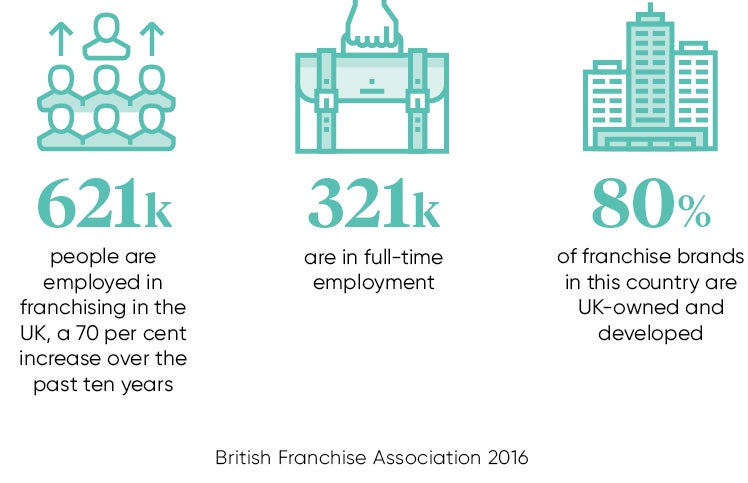With more than 900 brands, including some of the best-known names on the high street, and a £15.1-billion contribution to the UK economy, franchising is a sector of prosperity. Those who have invested in a franchised business are likely to agree; among franchisee-owned businesses 97 per cent are profitable, according to the British Franchise Association (bfa).
Underpinning its success – the industry has grown by 10 per cent in the last four years – is the proven, replicable business model on which the fundamental principle of good franchising is based. But one trend that could become influential in shaping the sector’s future is a growing focus on socially responsible franchising.
Whether it is supporting the local community, championing good causes or donating profits to charity, social responsibility is now part and parcel of the core business strategy of many franchises, at both corporate and local level.

CSR in action
Major global brands, such as McDonald’s and Subway, have committed to responsible sourcing of suppliers, environmental initiatives to reduce carbon emissions and packaging, and sustainability of their operations. At a local level, by engaging with social responsibility initiatives, McDonald’s franchisees have effectively become brand ambassadors within their local communities by supporting young people through sponsoring grassroots football and helping the environment by organising local litter pick-ups.
Other franchisors are now recognising the benefits of putting social responsibility at the heart of their business operations and promoting it at a local level. “Nowadays, prospective franchisees are looking for more than just money and the ability to help something bigger than just their business is always attractive,” says Carl Reader, non-executive director at the bfa and author of The Franchising Handbook.
“A key element of franchising is that the franchisee is part of a national business, but locally owned and managed. Charities such as Buttle UK can actually track donations, which provides location accountability, so a franchisee in Nottingham can be sure that every pound raised is passed on to children in Nottingham, rather than lost in a national pot of money.”
Responsible franchising could become crucial to recruiting franchisee talent, especially among the highly sought-after millennial generation. Research has shown that millennials are interested in business ownership, active in their community outside work and view changing the world for the better as a serious goal. Franchisors hoping to attract this next generation of franchise owners will need more than just a strong business concept with sound financial prospects.
Social responsibility in franchising creates a win-win situation
One important factor in franchisee recruitment is finding people who fit the franchise culture. As Steve Bolton, founder and executive chairman of property franchise business Platinum Property Partners, points out, a franchise with social responsibility at its core will attract like-minded franchisees.
His company has supported many charitable causes in the last ten years, donating money to local charities every month, and the network’s 500 franchise owners, or partners, are keen to do the same.
“They are encouraged to take part in charitable activities that are close their own hearts, as well as that of the business, for example running marathons, volunteering, even half beard shaving and wearing for a week,” says Mr Bolton. “We want people who want to help each other, their local community and causes that are close to their heart. Our culture of caring and giving back is a major attraction for our partners. It also puts off others who may consider it for self-serving reasons alone. And that’s fine because those types of people have no place in our business.”
Franchisor Freddie St George, owner of magazine franchise Raring2Go!, which has 53 franchisees, has a long history of supporting good causes through business. He organises the Italian Job Mini Car Rally, which has raised millions for children’s charities.
“We have selected two charities nationally which Raring2go! supports, but we also encourage franchisees to choose local causes to support,” he says. “There is a massive sense of community between our franchisees and their local audiences. The information in Raring2go! is of real local interest and aimed squarely at the family audience. Given the sense of trust we have established across our UK territories, a natural by-product is that our franchisees have become real brand ambassadors.”
Like a growing number of franchisors, Mr St George feels strongly about social responsibility as a core business value. He says: “It is as much part of our approach to doing business as offering exceptional customer service. I believe that businesses that operate in this space and embrace social responsibility will end up attracting brilliant candidates who will want to be part of the organisation and enjoy being involved in such initiatives.”
Social responsibility in franchising creates a win-win situation; greater brand awareness for the franchise and greater exposure for the local community cause or charity they support. It also creates a positive opinion of the franchise in the eyes of customers.
However, as Dr Felicity Hardley, senior lecturer in marketing and business strategy at Westminster Business School, explains, it is important that the right social issues are focused on and any activities are consistent with the overall brand image.
“There is often a risk that short-term performance pressures can dominate decisions when it comes to social-value creation,” she says. “As active and socially responsible community members, franchisees need to see these activities as a long-term investment and strategy, otherwise piecemeal efforts may be seen as inauthentic and just a ‘marketing ploy’ rather than something genuine.
“This is not to just improve competitiveness, but to attract talented employees and deliver more value to customers who care about society and the environment. If franchise businesses can make a lasting impact on local customers, those customers can offer long-term loyalty and this is something all businesses should aspire to.”

